In response to a chemical weapons attack by unknown perpetrators on August 21, US President Barack Obama, in a “coalition of the willing” with the governments of Britain and France, has made escalating threats for a military attack on Syria.
With the likelihood of Russia and China opposition in the UN Security Council, Obama has indicated that his coalition, calling itself the “international community”, may strike Syria unilaterally.
-
-
The streets of Cairo are running red, as Egypt's military carries out a brutal crackdown on supporters of ousted Muslim Brotherhood president Mohamad Morsi. On August 14, after weeks of threats and violent harassment, the Egyptian army moved to shut down protest camps in Nahda Square and outside the Rabaa al-Adawiya in Cairo, where supporters of Morsi have been staging sit-ins since his overthrow on July 3. By the evening, more than 500 protesters had been killed and thousands wounded. The army also killed three journalists in the attack.
-
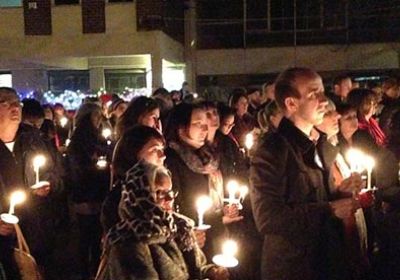 Several hundred people gathered in Greeves Street, St Kilda, on August 8 for a candlelit vigil for local street sex worker Tracy Connelly, who was murdered in the street on July 21. The vigil was a chance for her family, friends and, importantly, her community to honour her as well as protest against violence against women. The vigil was held outside the St Kilda Gatehouse, a drop-in centre and community resource for street sex workers.
Several hundred people gathered in Greeves Street, St Kilda, on August 8 for a candlelit vigil for local street sex worker Tracy Connelly, who was murdered in the street on July 21. The vigil was a chance for her family, friends and, importantly, her community to honour her as well as protest against violence against women. The vigil was held outside the St Kilda Gatehouse, a drop-in centre and community resource for street sex workers. -
Millions protesters of were again in the streets of Cairo and other Egyptian cities on July 26, both for and against the former Muslim Brotherhood government. Security forces attacked the pro-Morsi protesters, killing many in a fresh massacre. Ahram Online reported that these were the largest mobilisations since the June 30 protests that brought down the elected, but increasingly unpopular, Muslim Brotherhood-aligned government of President Mohamed Morsi.
-
The Egyptian army massacred 53 protesters who were calling for the release from detention and reinstatement of overthrown president Mohamed Morsi on July 8.
-
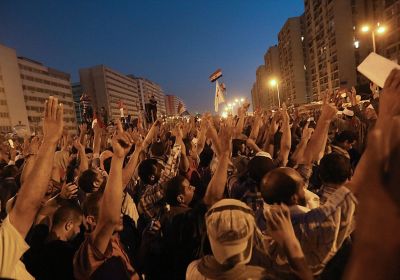 The protests which began on June 30 ― and by July 3 had led to the overthrow of President Mohamed Morsi ― were reportedly the largest in Egyptian history. With claims that between 10 and 20 million people took part, they were larger than the protests which led to the overthrow of President Hosni Mubarak on February 11, 2011.
The protests which began on June 30 ― and by July 3 had led to the overthrow of President Mohamed Morsi ― were reportedly the largest in Egyptian history. With claims that between 10 and 20 million people took part, they were larger than the protests which led to the overthrow of President Hosni Mubarak on February 11, 2011. -
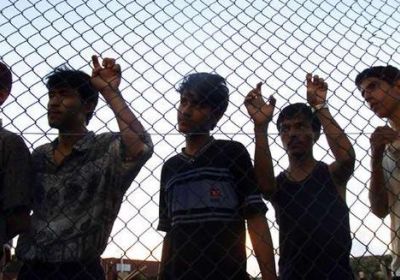 A social crisis is developing throughout suburban Australia. Asylum seekers on short-term bridging visas are being dumped in the community without the right to work, study or receive adequate welfare. Already traumatised by the situations they are fleeing, dangerous journeys and immigration detention, those on bridging visas face housing stress, food insecurity, alienation and boredom and a return to detention when their bridging visas expire. Processing of asylum claims is on hold and the threat of deportation is constant.
A social crisis is developing throughout suburban Australia. Asylum seekers on short-term bridging visas are being dumped in the community without the right to work, study or receive adequate welfare. Already traumatised by the situations they are fleeing, dangerous journeys and immigration detention, those on bridging visas face housing stress, food insecurity, alienation and boredom and a return to detention when their bridging visas expire. Processing of asylum claims is on hold and the threat of deportation is constant. -
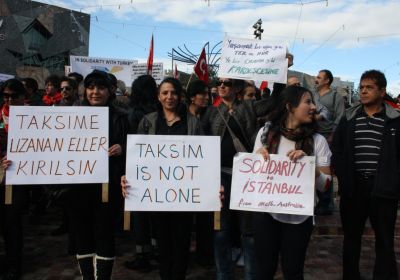 About 250 people, mainly from the Turkish and Kurdish communities, held a protest in Melbourne’s Federation Square on June 10 in solidarity with protesters in Taksim Square and Gezi Park, Istanbul, who have come under intense repression from the Turkish state. The rally was organised by the Melbourne Taksim Platform, a coalition consisting of the Anatolian Cultural Centre, the Australian Alevi Council and the Australian Turkish Cultural Association. The rally was also supported by the Kurdish Association of Victoria.
About 250 people, mainly from the Turkish and Kurdish communities, held a protest in Melbourne’s Federation Square on June 10 in solidarity with protesters in Taksim Square and Gezi Park, Istanbul, who have come under intense repression from the Turkish state. The rally was organised by the Melbourne Taksim Platform, a coalition consisting of the Anatolian Cultural Centre, the Australian Alevi Council and the Australian Turkish Cultural Association. The rally was also supported by the Kurdish Association of Victoria. -
In May 13 mid-term elections for both houses of Congress, and provincial and municipal-level local governments, the control of electoral politics in the Philippines by a small number of powerful, nepotistic families became a big issue. It was the left-wing Party of the Labouring Masses (PLM) that put the question of political dynasties onto the agenda. However, not all the PLM’s impact on the election translated into votes and, due to fraud, not all the votes the PLM received in the ballot box translated to votes in the official tally.
-
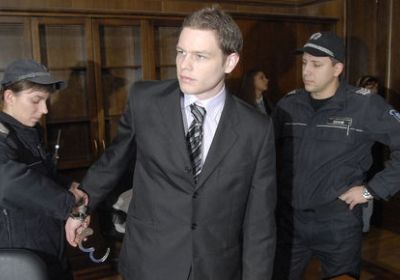 “I’m in Villawood!” Jock Palfreeman exclaimed, with the cheerful exuberance he displayed throughout an interview conducted through glass and wire-mesh partitions in the gloomy surroundings of the visiting room of Sofia central prison. He told Green Left Weekly that it was the plight of refugees detained in Sydney's Villawood detention centre that first radicalised him. His first protest, as a high school student in Sydney, was a blockade of the offices of Villawood’s then operator Australasian Correctional Management on May Day in 2002.
“I’m in Villawood!” Jock Palfreeman exclaimed, with the cheerful exuberance he displayed throughout an interview conducted through glass and wire-mesh partitions in the gloomy surroundings of the visiting room of Sofia central prison. He told Green Left Weekly that it was the plight of refugees detained in Sydney's Villawood detention centre that first radicalised him. His first protest, as a high school student in Sydney, was a blockade of the offices of Villawood’s then operator Australasian Correctional Management on May Day in 2002. -
 A 700-strong march wound its way through the medieval streets of Freiburg, in the south-west German state of Baden-Wurttemberg, on April 20 to protest against the imminent resumption of deportation flights from the state. The theme of the protest was “Those who want to stay should stay”. Those targeted for deportation are Roma refugees who fled Kosovo, Serbia and Macedonia during the Balkan Wars of the 1990s, and their German-born children.
A 700-strong march wound its way through the medieval streets of Freiburg, in the south-west German state of Baden-Wurttemberg, on April 20 to protest against the imminent resumption of deportation flights from the state. The theme of the protest was “Those who want to stay should stay”. Those targeted for deportation are Roma refugees who fled Kosovo, Serbia and Macedonia during the Balkan Wars of the 1990s, and their German-born children. -
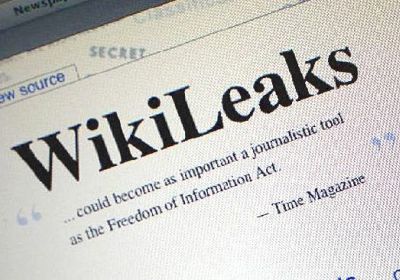 WikiLeaks has announced it will form a party to contest the Australian federal elections in September this year. Julian Assange has confirmed he will stand for election in the Victorian senate, with other WikiLeaks candidates in Victoria, New South Wales and Western Australia to be announced soon.
WikiLeaks has announced it will form a party to contest the Australian federal elections in September this year. Julian Assange has confirmed he will stand for election in the Victorian senate, with other WikiLeaks candidates in Victoria, New South Wales and Western Australia to be announced soon.